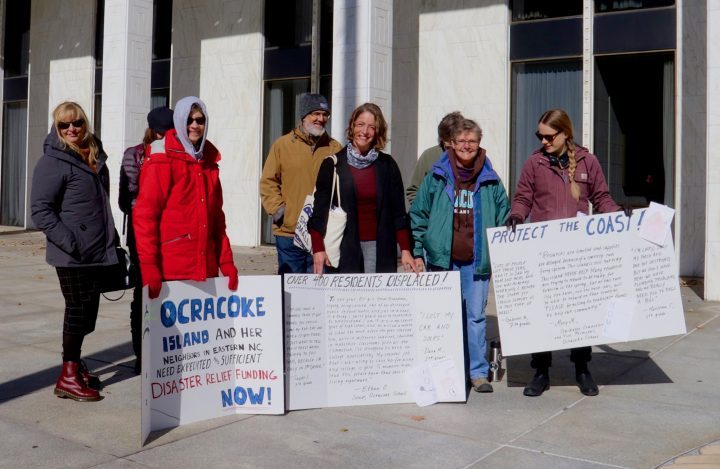
By Kirk Ross, Coastal Review Online
The state House and Senate approved Thursday $180 million in disaster recovery funding along with an array of policy changes as the General Assembly wrapped up work for the year.
The storm recovery bill was hammered out by House and Senate negotiators who dialed back some of what the House approved but left in place a significant boost to the state’s Dorian recovery efforts.
The two chambers initially agreed for the need for about $122 million in state funds needed to match federal disaster aid for Hurricanes Matthew, Florence, and Dorian and Tropical Storm Michael. Without the additional funds, accounts providing the 25% state share for debris removal, infrastructure repair and other work were expected to run dry by the end of the month.
Everything beyond that was part of an ongoing negotiation until a deal was locked down on Wednesday.
The final version of the bill, which passed both House and Senate with only one dissenting vote, includes $1.7 million for Ocracoke School repairs, money for flood control around Lake Mattamuskeet and additional state help for local governments to speed up Dorian recovery.
Rep. Bobby Hanig, R-Currituck, said the bill marks an important step in the journey back from disaster.
“Ocracoke has a long road to recovery, and this will be instrumental in that recovery,” he said.
The bill’s passage came as a relief to Ocracoke residents as they prepare for yet another weekend of high winds and heavy swells.
Peter Vankevich, co-publisher of the Ocracoke Observer, said there’s relief the bill has passed but also an immediate worry that some of the progress on the island’s roads could be set back if the storm forecast for this weekend is bad enough. It could slow the final bit of progress needed to reopen N.C. 12.
“You get two days of 30-knot winds and a lot can happen here, he said.
Vankevich was one of several who greeted Ocracoke resident Kelley Shinn when she returned home Thursday after visiting Raleigh to take the island’s case directly to legislators. Shinn met with Rep. Chuck McGrady, R-Henderson, and joined a group of other Ocracoke supporters outside the Legislative Building Wednesday to raise awareness about the island’s needs.

Shinn said she was glad to see the funding in the bill was similar to the higher House levels, compared to the Senate version, and included the key items for Ocracoke and Hyde County. Residents will want to dig into the details on the funding and what programs and services it will go for, she said.
“I think we are ever hopeful, but still cautious,” Shinn said. Transparency, she said, will be important at all levels.
Ninth-generation Ocracoke resident Trudy Austin agreed and said she was confident Gov. Roy Cooper, who visited the island shortly after the disaster, will sign the bill.
Austin said Shinn’s trip provided inspiration in that people are listening.
“The island’s pretty excited about what she did, going there and standing up for us,” Austin said.
Recovery on the island will continue to depend on a mix of state and federal aid. Last month, the Federal Emergency Management Agency rejected the governor’s request for federal Individual Assistance, saying the disaster had not reached necessary damage thresholds. A program to provide state individual assistance grants to fill that gap is expected to begin soon, said Keith Acree, a spokesperson for the Department of Public Safety. Acree said individuals who did not qualify for help through a Small Business Administration grant program would be able to apply for the individual assistance grants.
The state is also in the process of finalizing a $600,000 grant to Hyde County. Half of the funds will go to rental assistance and for the purchase of 35 travel trailers for temporary housing. The other half will go for project management assistance for countywide recovery programs.
Resiliency planning
The bill contains some of the House version’s resiliency initiatives along with policy revisions clarifying the role and authority for the recently created state Office of Recovery and Resiliency.
It leaves out proposed funding aimed specifically at resiliency planning for the state’s 20 coastal counties. Also on hold is a $32 million update to the state’s floodplain mapping program and a $5 million appropriation for buyouts of hog farms in the 100-year floodplain.
Bill co-sponsor McGrady said he was surprised that Senate negotiators agreed to as much as they did, considering the Senate version focused almost solely on the needed matching funds. McGrady said he had been promised that the buyout funds and resiliency initiatives would be up for further discussion when the legislature returns in January to work on additional recovery legislation.
Other policy provisions in the bill include additional flexibility for local governments to allow them to combine costs and projects and reallocate funds from individual storms.
The bill also implements a legislative review panel’s recommendation for new state systems, responsibilities and oversight for disaster recovery under the Office of Recovery and Resiliency.
A provision in the bill giving the legislature explicit authority to determine the distribution of money from legal settlements drew a sharply worded statement from the governor’s office just before the vote on the bill that said the provision was an attempt to get around a court case regarding funds from the Volkswagen emissions testing fraud settlement.
The bill “uses disaster victims as political pawns,” Governor’s Office spokesperson Megan Thorpe said in the statement.
Sen. Bill Rabon, R-New Brunswick, responded in a statement that the governor had his facts wrong and the provision “simply re-affirms existing state law.”
The statement from the governor’s office did not contain an explicit veto threat and McGrady told House members that he understood that although the governor objected to the specific provision, he supported the recovery bill.
Also on Thursday, both chambers passed separate Department of Transportation funding and oversight bills covering recent outlays for disaster spending and funding some resiliency work and planning studies.
The spending includes $2 million for work expanding living shorelines around critical transportation infrastructure.
Funding highlights for House Bill 200 include the following:
- $70,812,336 to the Hurricane Florence Disaster Recovery Fund to provide state match for Florence federal disaster assistance programs.
- $11,197,013 for state match for Hurricane Matthew related federal disaster assistance programs.
- $4,176,245 for state match for Hurricane Matthew related federal disaster assistance programs.
- $17,800,000 for state match for Hurricane Dorian-related federal disaster assistance programs and similar state assistance that may supplement federal assistance or cover housing repairs and rehabilitation for those who do not qualify for federal assistance.
- $17,600,000 for the state match for additional federal funds for the state’s Clean Water State Revolving Fund and the Drinking Water State Revolving Fund.
- $5 million to replenish the state’s Emergency Response and Disaster Relief Fund for future storms.
- $5 million for expansion of flood-mitigation studies
- $4.8 million for water and breach level monitoring systems for 1,510 high- and intermediate-risk dams.
- $15 million to the state Office of Recovery and Resiliency, including $10 million for a bridge loan program for local governments affected by Matthew, Michael, Florence or Dorian to kickstart FEMA and Hazard Mitigation Grant projects and $5 million in grants to local governments for Dorian disaster recovery.
- $15 million for Golden LEAF grants for infrastructure repair.
- $5 million for stream debris removal.
- $5.2 million for repairs to storm damage at Elizabeth City State University.
- $1.7 million for repairs at the Ocracoke School.
- $1.8 million to Hyde County for a pump station at Lake Mattamuskeet.
- $50,000 for restoration work at Coastal Reserve sites damaged during Dorian.

